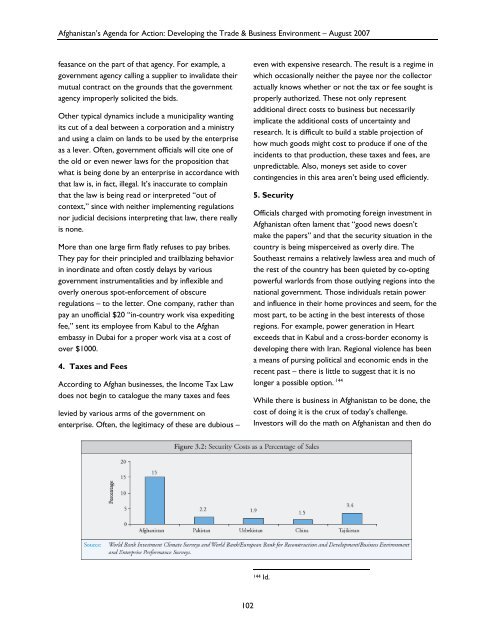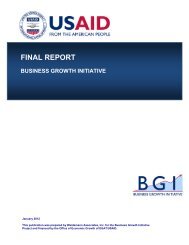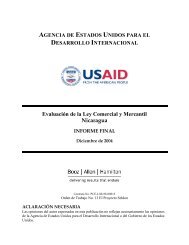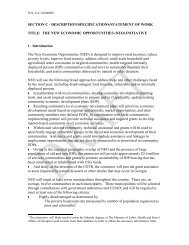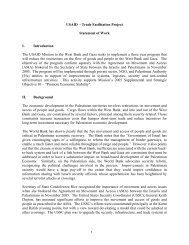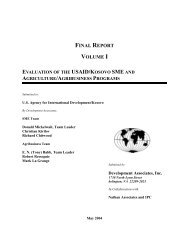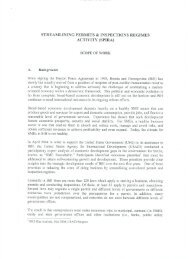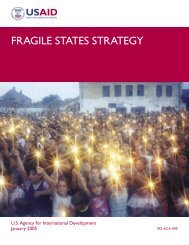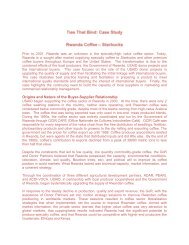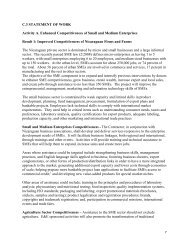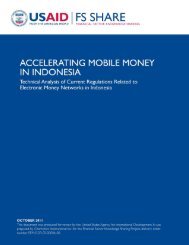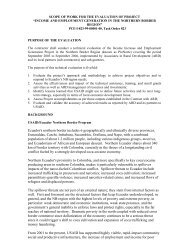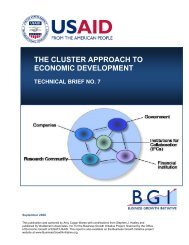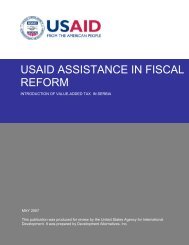Afghanistan's Agenda for Action - Economic Growth - usaid
Afghanistan's Agenda for Action - Economic Growth - usaid
Afghanistan's Agenda for Action - Economic Growth - usaid
Create successful ePaper yourself
Turn your PDF publications into a flip-book with our unique Google optimized e-Paper software.
Afghanistan’s <strong>Agenda</strong> <strong>for</strong> <strong>Action</strong>: Developing the Trade & Business Environment – August 2007feasance on the part of that agency. For example, agovernment agency calling a supplier to invalidate theirmutual contract on the grounds that the governmentagency improperly solicited the bids.Other typical dynamics include a municipality wantingits cut of a deal between a corporation and a ministryand using a claim on lands to be used by the enterpriseas a lever. Often, government officials will cite one ofthe old or even newer laws <strong>for</strong> the proposition thatwhat is being done by an enterprise in accordance withthat law is, in fact, illegal. It’s inaccurate to complainthat the law is being read or interpreted “out ofcontext,” since with neither implementing regulationsnor judicial decisions interpreting that law, there reallyis none.More than one large firm flatly refuses to pay bribes.They pay <strong>for</strong> their principled and trailblazing behaviorin inordinate and often costly delays by variousgovernment instrumentalities and by inflexible andoverly onerous spot-en<strong>for</strong>cement of obscureregulations – to the letter. One company, rather thanpay an unofficial $20 “in-country work visa expeditingfee,” sent its employee from Kabul to the Afghanembassy in Dubai <strong>for</strong> a proper work visa at a cost ofover $1000.4. Taxes and FeesAccording to Afghan businesses, the Income Tax Lawdoes not begin to catalogue the many taxes and feeslevied by various arms of the government onenterprise. Often, the legitimacy of these are dubious –even with expensive research. The result is a regime inwhich occasionally neither the payee nor the collectoractually knows whether or not the tax or fee sought isproperly authorized. These not only representadditional direct costs to business but necessarilyimplicate the additional costs of uncertainty andresearch. It is difficult to build a stable projection ofhow much goods might cost to produce if one of theincidents to that production, these taxes and fees, areunpredictable. Also, moneys set aside to covercontingencies in this area aren’t being used efficiently.5. SecurityOfficials charged with promoting <strong>for</strong>eign investment inAfghanistan often lament that “good news doesn’tmake the papers” and that the security situation in thecountry is being misperceived as overly dire. TheSoutheast remains a relatively lawless area and much ofthe rest of the country has been quieted by co-optingpowerful warlords from those outlying regions into thenational government. Those individuals retain powerand influence in their home provinces and seem, <strong>for</strong> themost part, to be acting in the best interests of thoseregions. For example, power generation in Heartexceeds that in Kabul and a cross-border economy isdeveloping there with Iran. Regional violence has beena means of pursing political and economic ends in therecent past – there is little to suggest that it is nolonger a possible option. 144While there is business in Afghanistan to be done, thecost of doing it is the crux of today’s challenge.Investors will do the math on Afghanistan and then do144 Id.102


